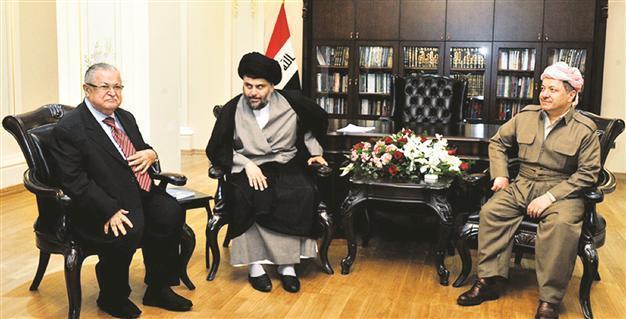Arbil statement calls for solution to Iraqi political deadlock
ARBIL

Iraqi President Talabani (L), Iraqi Kurdish leader Barzani (R) and Shiite cleric al-Sadr (C) meet in Arbil. AFP photo
Leaders from nearly all of Iraq’s top political blocs called April 28 for a solution to a crisis pitting the Shiite-led government against Sunnis and Kurds, saying the dispute threatens the country’s national interests.The statement came after three days of meetings that brought together senior Sunni, Kurdish and even Shiite politicians disgruntled with Prime Minister Nouri al-Maliki, who was not represented at the talks in Arbil, the capital of Iraq’s northern Kurdish region. While no one at the mini-summit demanded that al-Maliki step down, the fact that the discussions included key figures from across Iraq’s political spectrum underscored the growing impatience with the Shiite prime minister.
A statement issued after the meeting in Arbil said the leaders “stressed the need for finding ways to dismantle the crisis, the continuation of which puts the supreme national interests in danger.” They also discussed “ways to strengthen the democratic process.” The talks were hosted by Masoud Barzani, the president of the Kurdistan Regional Government (KRG), and included Iraqi President Jalal Talabani, a Kurd, as well as former Prime Minister Ayad Allawi and hard-line cleric Muqtada al-Sadr, both Shiites. Parliamentary Speaker Osama al-Nujaifi, a Sunni, also took part.
Priority of Iraqi interests
The broad front represented at the meeting ratcheted up the pressure on al-Maliki to engage his political foes and cede to some of their demands.
Solutions should be “in accordance with the Arbil agreement, what al-Sadr said in his statement, and the constitutional bases that define decision-making and policies,” the statement said, referring to a power-sharing deal on the formation of the current government and points made by al-Sadr on April 26. Al-Sadr pointed out “minorities are an important part of Iraq, and we have to bring them to participate in building Iraq, politically, economically and in security.” He called for “canceling the policy of neglect and marginalization,” adding that priority must be given to “Iraqi interests over sectarian and ethnic and party interests.”
The months-long political impasse began when the government issued terrorism charges against the nation’s highest-ranking Sunni, Vice President Tariq al-Hashemi, as the final U.S. troops left Iraq in December. Al-Hashemi fled to northern Iraq, which declined to hand him over to Baghdad and then permitted him to leave on a regional tour that took him to Qatar, Saudi Arabia and Turkey.
Turkish Deputy Prime Minister Ali Babacan meanwhile said the real problem in Iraq stemmed from Baghdad, not from the KRG.
Compiled from AP, AFP and AA stories by the Daily News staff.
















